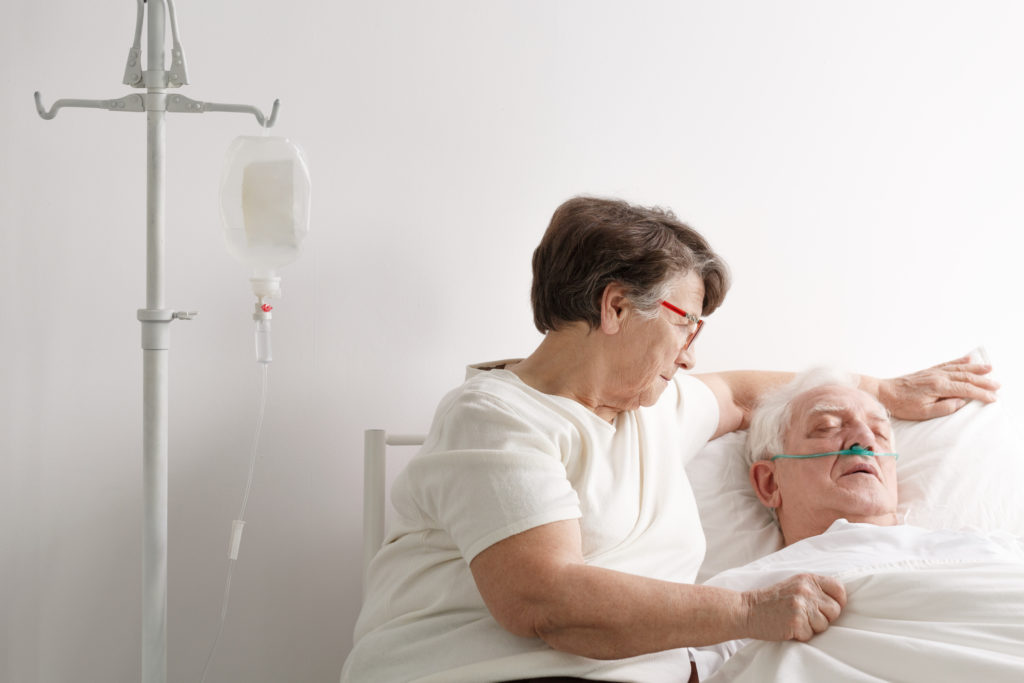Deciding When It’s Time to Say Good-Bye

Sarah Harrison arrived at the hospital to find her 92-year-old father, Henry, lying unconscious in the ICU. He was living with an aggressive form of lung cancer. A nurse was able to revive him just long enough for him to acknowledge Sarah’s presence. He then lapsed back into an unconscious state. Doctors told her that while the prognosis wasn’t good, they could start an aggressive form of treatment that may be able to extend his life by several months. He was often in pain, which was being mitigated with medication. He was being fed through an IV tube and couldn’t breathe on his own. Because Henry didn’t have a living will and hadn’t ever discussed his medical wishes, Sarah was left wondering what to do regarding his care. She couldn’t stand to see him suffer, but didn’t want to hasten his death if there was a possibility he could have a few more months of life.
It’s one of the most difficult facets of the human experience – having someone we love living in pain and having to make life-and-death decisions regarding their care. With today’s advances in healthcare, we have more options than ever before to delay the inevitable. But, more and more, people are beginning to ask if treating someone who has multiple health challenges and is nearing the end of their life really makes sense.
Studies tell us that approximately 80 percent of Americans would prefer to die at home. Yet, according to the Stanford School of Medicine, nearly 80 percent of Americans end up dying in a hospital, nursing home, or other acute care setting. This had led to some physicians beginning to question the ethics of extending a life that is rapidly diminishing and if doing so is the best way to care for the lives they’ve sworn to help.
It’s an agonizing decision. Most people want to feel they did everything possible to prolong a loved one’s life. Guilt is often an emotion that arises after a loved one has passed and taking a proactive approach to minimize that remorse is understandable. Doctors are trained to do everything they can to cure their patients and very few are adequately trained in hospice or palliative care. The Institute of Medicine’s report Dying in America concluded that “people who indicate end-of-life care preferences [usually] choose care focused on alleviating pain and suffering. However, because the default mode of hospital treatment is acute care, advance planning and medical orders are needed to ensure that these preferences are honored.”
As the report says, because the default response for most families and doctors is to extend life, it’s very important for individuals to make their medical wishes known before a crisis occurs. We’ve discussed the importance of planning ahead to help ensure your medical wishes are honored. Massachusetts is one of only three states that does not recognize living wills, but you should still create one. If nothing else, it provides important guidance to your agent, other loved ones and health care providers about your wishes. It allows you to dictate decisions when it comes to your care, including if you want life-sustaining treatments (CPR, ventilators, feeding tubes, etc.). In addition to creating a living will, you should have a conversation with your loved ones and your physician(s) about your wishes, so everyone knows and understands what you want. This way, not only will you get the care you want, your loved ones will be able to act with more clarity, sparing them unnecessary heartache.
For more information, please visit Honoring Choices Massachusetts, a community partner of ours. Honoring Choices Massachusetts is a consumer-oriented, nonprofit organization focused on the rights of every adult to direct their healthcare choices. They can help you make a plan and provide the resources to help you ensure your end-of-life wishes are honored.
The transition from life to death is one of the most difficult challenges we face, both for ourselves and for those we love. Proper planning and open communication can make it easier for everyone and help to ensure you’ll have the end-of-life care you want.
![LifeCare Advocates [logo]](https://www.lcadvocates.com/wp-content/uploads/sites/270/2017/11/logo.png)